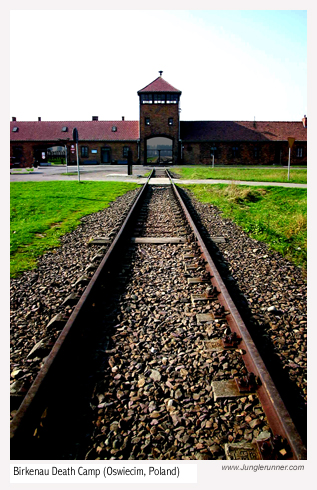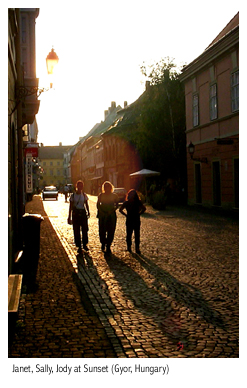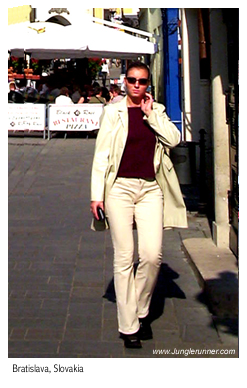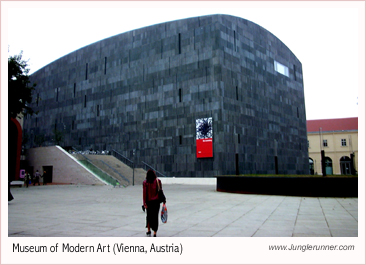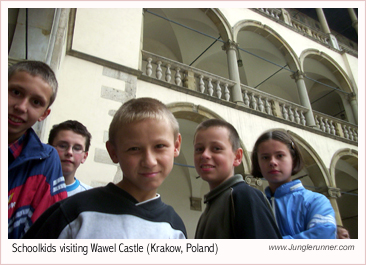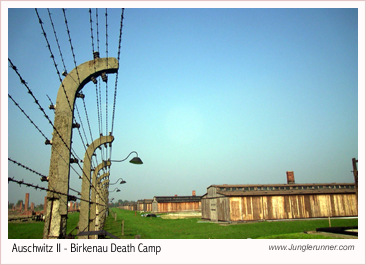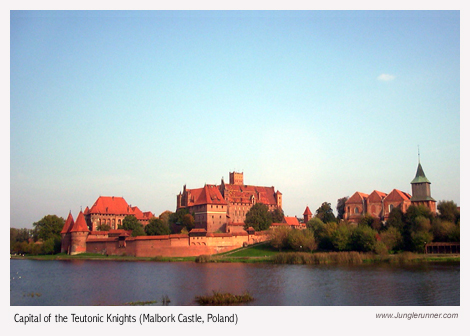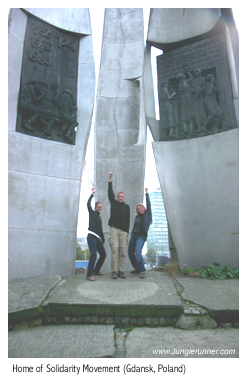
. . . LAND ROVER OVERLAND EXPEDITION
#15 - Slovakia, Austria & Poland (Olsztyn, POLAND) - Eight days after leaving Istanbul we were already sweeping through northern Hungary, following the curve of the Danube river north from Budapest and west toward the border of Slovakia. After stuffing half-dozen buns and some bologna from the breakfast buffet at our Budapest hotel into a daypack, we drove past the fantastically steepled Parliament, underneath Buda Castle, Fisherman's Bastion, along the river and out of town. Nineteen kilometers north was Szentendre, a pretty little town of narrow winding streets, Serbian Orthodox churches, and art and craft galleries. It's proximity to Budapest and peaceful shaded streets make Szentendre a popular day-trip destination. Pretty Hungarian women in svelte ensembles promenaded past, boyfriends clamped in tow. Middle-aged couples ambled along the river. An aged babushka at the table next to me fed morsels of her sandwich to a little brown spaniel. Eastern Europeans love their little dogs. We wandered the cobbled streets, exploring interesting buildings and stopping for cappuccino at a sunlit sidewalk caf�. Several kilometers west along the river we climbed through Visegrad Citadel. Hungarian kings built the massive citadel after the 13th century Mongol invasions. Haze was thick in the air and it was hard to see any distance, the Danube faded quickly into the far hills. Munching on our buns and meat in the truck, we continued along the river, and in Esztergom a cathedral unexpectedly obliterated our perspective. Hungary's biggest church, it sits massively on a hill overlooking the river, its neoclassical towers commanding the sky. Inside, the art, the pipe organ, marble floors and the huge sweep of the place, all demanded reflection. The women set off into the church treasury but I was slowing down. A throat infection was nagging me (and would knock me flat by Austria). Again we loaded into the truck, and again we stopped - this time in Gyor. We walked through the 'charming old center', peeked into another church, got lost in the maze of cobbled streets and found ourselves, and mounted up again. Four cities in a day. Supercharged sightseeing.
At dusk we reached the border of Slovakia and were stamped through in one of the fastest border crossings yet. Bratislava, the capitol city, is adjacent to the border, and we wearily followed the evening regime of finding a palace to stay. Navigating with the questionable guidebook map to a recommended hotel, women run inside to check it out and bargain, and run out with a verdict. This night was about average. The first pension was closed for renovations, the second hostel was full, but the third hotel out in Bratislava's suburbs was decently priced at $25 per double and had rooms. You're reading this, detecting a wee lack of enthusiasm, maybe thinking to yourself that is sounds like we are punching a time clock, racking up the cities without time to savor their flavor. Some days that certainly feels true. We have a travel routine, the schedule demands almost non-stop driving. But the rewards come unexpectedly. This night it was the hot & sour soup at the Chinese restaurant attached to our hotel, thick and tangy with substantial bits of meat, it was unexpectedly great on an evening when I was feeling terrible. Our expedition route has changed in order to steer clear of the Middle East. We decided to make a mad dash north through Eastern Europe past St. Petersburg to Norway's frozen northern shores - and from there turn south back through Scandinavia and Western Europe to the docks of Bilbao, Spain. So this is a more ambitious route. We are now attempting to drive from Africa's most southern point to Europe's most northern, and then make a circumference of the globe westward, Istanbul to Istanbul. To cram the new route in, we had to have the Land Rover ready in Spain for shipment to South America by mid-Nov. We have six weeks to do Europe. Six weeks to cover twelve thousand kilometers through; Bulgaria, Romania, Hungary, Slovakia, Austria, Poland, Lithuania, Latvia, Estonia, Russia, Finland, Norway, Sweden, Denmark, Germany, Netherlands, Belgium, France, and Spain. As the throat infection took hold, it got harder to sustain interest in the minutiae of differences in the stream of churches and old cities. I huddled in a caf� in Bratislava while the women toured downtown. By noon it was time to move on, this time a short drive into Austria to Vienna. I stayed behind at the hostel while the women went downtown, swallowing painfully and feeling sorry for myself. Read a book, did laundry, puttered around the block. For some reason in April of 2001 the Czech Republic decided to require visas of Canadian visitors, and more crushingly, their visa process takes five days to complete. We had planned to drive through Prague but instead decided to backtrack through Slovakia and go north through Poland. A really lucky decision because on the changed route we would visit Auschwitz. Waiting for Polish visas required a three day stay in Vienna. There were some theoretical cultural highlights, for example Janet and I visited the Modern Art Museum. But for the most part I couldn't connect with the curator's vision of important modern art - naked old guys wearing rubber penises jumping up and down in stop frame video? Honestly. Then there was the opera, we bought good tickets for Carmen and everyone dressed up in European black outfits. Now I don't want to come across like a cultural philistine and I should probably rattle off some line about the influence of the subtle melodies, but sitting there in the audience listening to a French opera with German translation on the proscenium screen, feeling achey, feverish and swallowing with difficulty - I realized that I hadn't eaten any substantial food in fourteen hours and I was hungry. So I walked out and went to a restaurant across the street. "Are you coming from the opera across the street?" asked the waitress. "Well, yes�" I said nervously, "it's a good Carmen, but lacking in some elements." "So how would you rank it?" I paused, "Umm. Medium." She stifled a grin and dished up the food. Twenty minutes later I still lingered and she popped over to the table, "Intermission is in ten minutes - in case you are going to sneak back in." She winked. Ok, so I am a cultural philistine.
On Thursday we ducked back into Slovakia, skirted the north-west quarter of the country, and crossed into southern Poland heading north to Krakow. There is definitely something to be said for traveling with a good team. After six days of nagging pain I was grumpy and useless, so Sally had taken over driving, Jody cooked dinner that evening, and Janet volunteered to take the floor in our three-bed hostel room. The next morning I wandered listlessly behind the women as they tramped around Krakow's beautiful downtown square looking for a doctor. Finding a clinic I paid my $10 and was examined by a young Polish specialist. Evidently I'd stumbled into a viral and bacterial infection. "I am prescribing some painkillers, since you have already had this for six days maybe your body can finish it off. But if not, then take these antibiotics." A half hour later I was floating across the square on a blessed pharmaceutical pain-free cloud. I really do love downtown Krakow. It's beautiful, and old, and has lots of nice shops and restaurants, and I'm not just saying that because of the drugs. Honestly.
Auschwitz. A name branded onto the conscience of our generation. It was an incongruously beautiful fall day when we entered the camp. But the crisp air and warm sun didn't lessen the impact of the place, in fact the beautiful weather only seemed to make the neat brick barracks and rows of wire fences more tragic. Auschwitz was originally a Polish cavalry post, and was modified by the Nazi army to be a political prison. It was several years later after some local test runs to prove the effectiveness of the poison gas that Auschwitz II - Birkenau was constructed nearby. Birkenau was a death factory. Train tracks led through the camp gate, disgorging thousands of feeble captives onto the kilometer-long platform. Some prisoners were directed into the sea of drafty wooden bunkhouses, but the vast majority were herded down four alleys to the gas chambers. In a long underground concrete room they were asked to undress for a disinfecting shower. Then ushered into an adjoining long underground room, doors were sealed and the poison gas pellets rolled in. Mechanical lifts efficiently lifted the bodies up into a processing room where gold fillings were removed, luggage and effects were sorted, and women's hair was shaved off. Then a few meters away, the bodies were shoveled into furnaces. What struck me more than anything was the meticulousness of the operation. Well constructed, smoothly organized, if one accepted the premise that Jews were not human then it made perfect sense. Why not sell 20kg packages of human hair to the textile industry - after all it was a commodity. Why is it that humankind will accept a big lie more easily than a little one? And in our seemingly logical and well organized world, are we missing one or two other big lies? How powerful is the simple premise that "all men are created equal", and what evil can be done when this fact is forgotten! It was a sobering and powerful day. North from Auschwitz we drove several hundred kilometers into the night. In Torun we found a boarding house for high-school kids that had room. As usual, we wandered the downtown the next morning. A Skoda sponsored rally was tearing off from the downtown square. Sally, Jody and I explored the home of Copernicus. We drove. Saw Malbork Castle, home of the Teutonic Knights that carved an empire in the Baltic area during the 15th century. I really wanted to see Gdansk where the Solidarity movement started, so we wandered the town till we spotted the huge monument. Walking the streets of Gdansk at night was picture postcard beautiful. "Great Polish foodski!" said Sally. "Yesski." "Lookski! Cathedralski!" commented Jody. "Niceski" offered Janet. Seriously, there are a lot of 'ski' words in Polish. When asking directions we would slow down and roll down the window� "Hello? Helpski?" East and north, down tree-lined lanes through lake country, we meandered the last couple hundred kilometers out of Poland toward the Baltics. Fourteen cities, four countries, three thousand kilometers - in eight days. We have taken to calling this the Attention Deficit Disorder tour of Europe. This mad dash ain't for most folks, but the unexpected moments stay like gems in your memory; Chinese soup, sunsets on castles, midnight walks down cobbled streets, and long leafy lanes. Ask me if I'd rather be doing anything else, I'd say no way - especially if I'm on those painkillers!
|
All rights reserved
